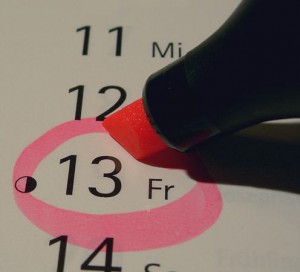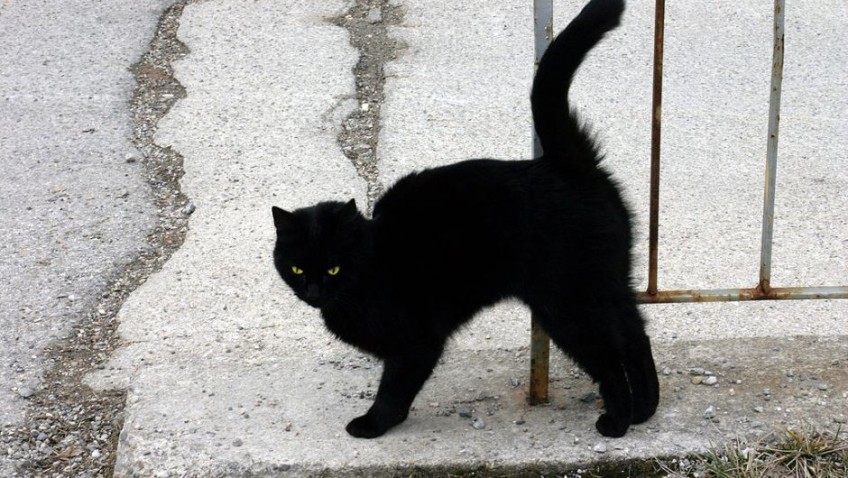With another Friday 13th looming I am interested to find out how many of us are superstitious and why some of these ideas came into common use.
 The over-65s are the most superstitious group of all, with 71% of them believing in the British Isles’ most popular superstition of touching wood for good luck. As expected, the 55 to 64 age group follows suit with 68% of people believing the same.
The over-65s are the most superstitious group of all, with 71% of them believing in the British Isles’ most popular superstition of touching wood for good luck. As expected, the 55 to 64 age group follows suit with 68% of people believing the same.
Things change in the 45 to 54 age group, where the most common superstition switches to receiving bad luck for walking under ladders. 62% of this group believes in it, as does 51% of 35 to 44-year-olds, again the most popular choice.
The origins of Friday the 13th being an unlucky date are shrouded in mystery.
The most commonly held perception is that Friday is an unlucky day and 13 is a particularly unlucky number.
In numerology 13 is considered to be an irregular number and is also the number of witches you need to form a coven.
Some say the roots of 13 being considered unlucky lie in a Nordic myth about 12 gods having a dinner party at Valhalla.
The 13th guest was Loki, the god of mischief, who arranged for the god of joy and gladness to be shot with a mistletoe-tipped arrow. He died and the whole world was thrust into mourning.
There is also a biblical reference to 13 being considered unlucky. Judas, one of the twelve apostles of Jesus who later betrayed him, was supposedly the 13th guest to sit down at the last supper.
Ancient Christianity may also yield some clues as to why Friday is perceived as unlucky. Christ was crucified on a Friday and Cain is believed to have killed his brother Abel on a Friday, perhaps even Friday 13th. Some biblical scholars believe that Eve tempted Adam with the forbidden fruit on a Friday.
In the 14th century Geoffrey Chaucer referenced Friday as being an unlucky day in his Canterbury Tales, “And on a Friday fell all this mischance”.
 Seafarers have long considered it is bad luck to set off on a journey on a Friday. It was also historically known as the day that people were usually hanged in Britain.
Seafarers have long considered it is bad luck to set off on a journey on a Friday. It was also historically known as the day that people were usually hanged in Britain.
In the 1990s medical researchers tried to prove whether or not people are particularly prone to misfortune in Friday 13th.
The results published in the British Medical Journal, noted that the number of motor accidents in the South West Thames region increased from a total of 45 on the six Friday 6ths between 1989 and 1992, to some 65 accidents on the six Friday 13ths in the same period – an increase of 52 per cent.
Researchers in Sweden also claimed that the country was a more risky place to be on Friday the 13th.
Friday the 13th has a cost to the economy because people will not fly or do business they normally would do.
However Dr Caroline Watt of the University of Edinburgh says that it is the belief in the Friday 13th superstition that could, in fact, prove the greatest risk to the average person:
“If people believe in the superstition of Friday the 13th then they believe they are in greater danger on that day. As a result they may be more anxious and distracted and this could lead to accidents. It becomes a self fulfilling prophecy.
 “It is like telling someone they are cursed. If they believe they are then they will worry, their blood pressure will go up and they put themselves at risk.”
“It is like telling someone they are cursed. If they believe they are then they will worry, their blood pressure will go up and they put themselves at risk.”
Black cats are considered unlucky in the UK although not in some parts of Scotland and in some countries they are thought to bring good luck.
A rabbit’s foot brings good luck but obviously not for the rabbit but why? And what is it about four-leafed clovers?
Some superstitions do have a basis in truth such as eating fish is good for the brain and we now know the omega 3 in fish is good for your health. While just smelling a dandelion will not make you wet the bed the plant does have some diuretic qualities.
Do you or your family have any favourite superstitions or ones that you know cannot be true but still follow them anyway – just in case? Ed.
Featured image by Nino Barbieri at www.wikimedia.org




